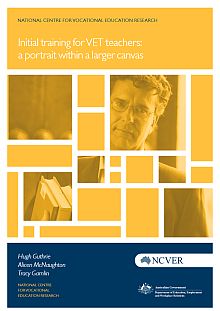
The UNESCO-UNEVOC International Centre: Who We Are | What We Do | Working With Us | Get in Touch
The UNEVOC Network: Learn About the Network | UNEVOC Network Directory
For Members: UNEVOC Centre Dashboard
Thematic Areas: Inclusion and Youth | Digital Transformation | Private Sector Engagement | SDGs and Greening TVET
Our Key Programmes & Projects: BILT: Bridging Innovation and Learning in TVET | Building TVET resilience | TVET Leadership Programme | WYSD: World Youth Skills Day
Past Activities: COVID-19 response | i-hubs project | TVET Global Forums | Virtual Conferences | YEM Knowledge Portal
Our Services & Resources: Publications | TVET Forum | TVET Country Profiles | TVETipedia Glossary | Innovative and Promising Practices | Toolkits for TVET Providers | Entrepreneurial Learning Guide
Events: Major TVET Events | UNEVOC Network News

| Author/s: | Hugh Guthrie, Alicen McNaughton, Tracy Gamlin |
| Publisher/s: | NCVER |
| Published: | 2011 in Australia |
| ISBN: | 978 1 921955 13 6 |
| ISBN online: | 978 1 921955 11 2 |
This report examines initial vocational education and training (VET) teacher training. It focuses specifically on teachers in institutional settings, particularly public and private VET registered training organisations (RTOs). The present project set out to investigate generic VET teaching qualifications, ranging from a certificate IV to an advanced diploma delivered by VET and associate and bachelor degrees, to graduate diplomas delivered by higher education. It is part of a significant body of current work concerned with VET workforce and teaching issues and also draws on that work.
Specifically, our study aimed to:
identify the key teaching qualifications currently available for initial VET teachers being delivered across Australia and document their key attributes
use available data from 2006 to 2008 on initial teacher training courses to identify trends in enrolment numbers, numbers continuing and completing, the characteristics of learners accessing these courses and the level of qualifications already held before commencing their teaching award. Information on the outcomes for the VET-level courses was also examined. by means of the Student Outcomes Survey (SOS).
Information about the individual courses offered in both VET and higher education was based on offerings in 2010.